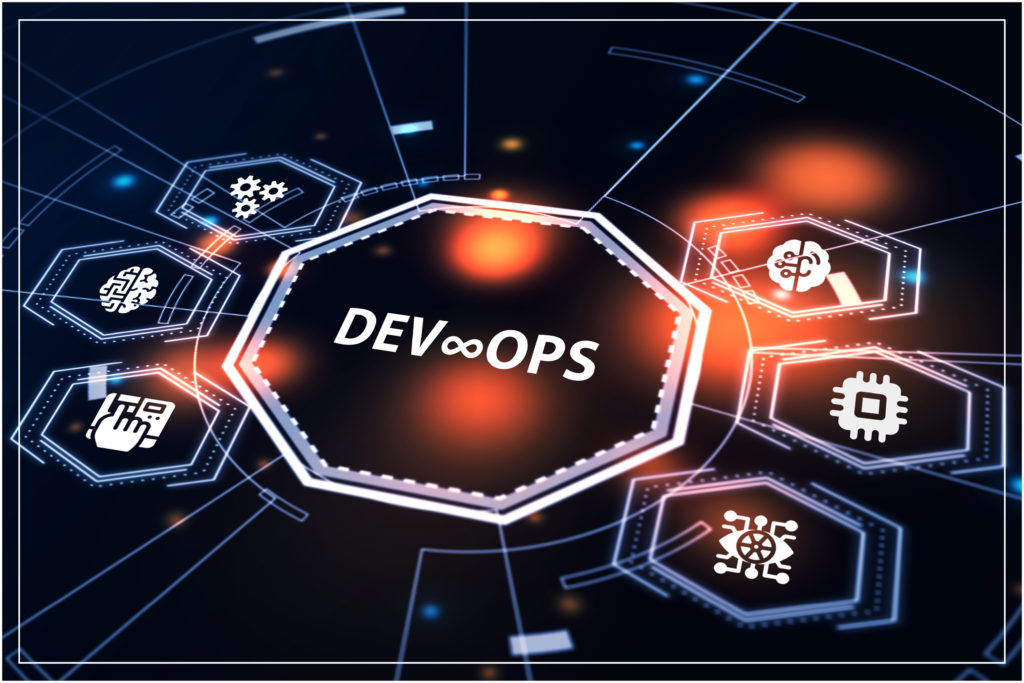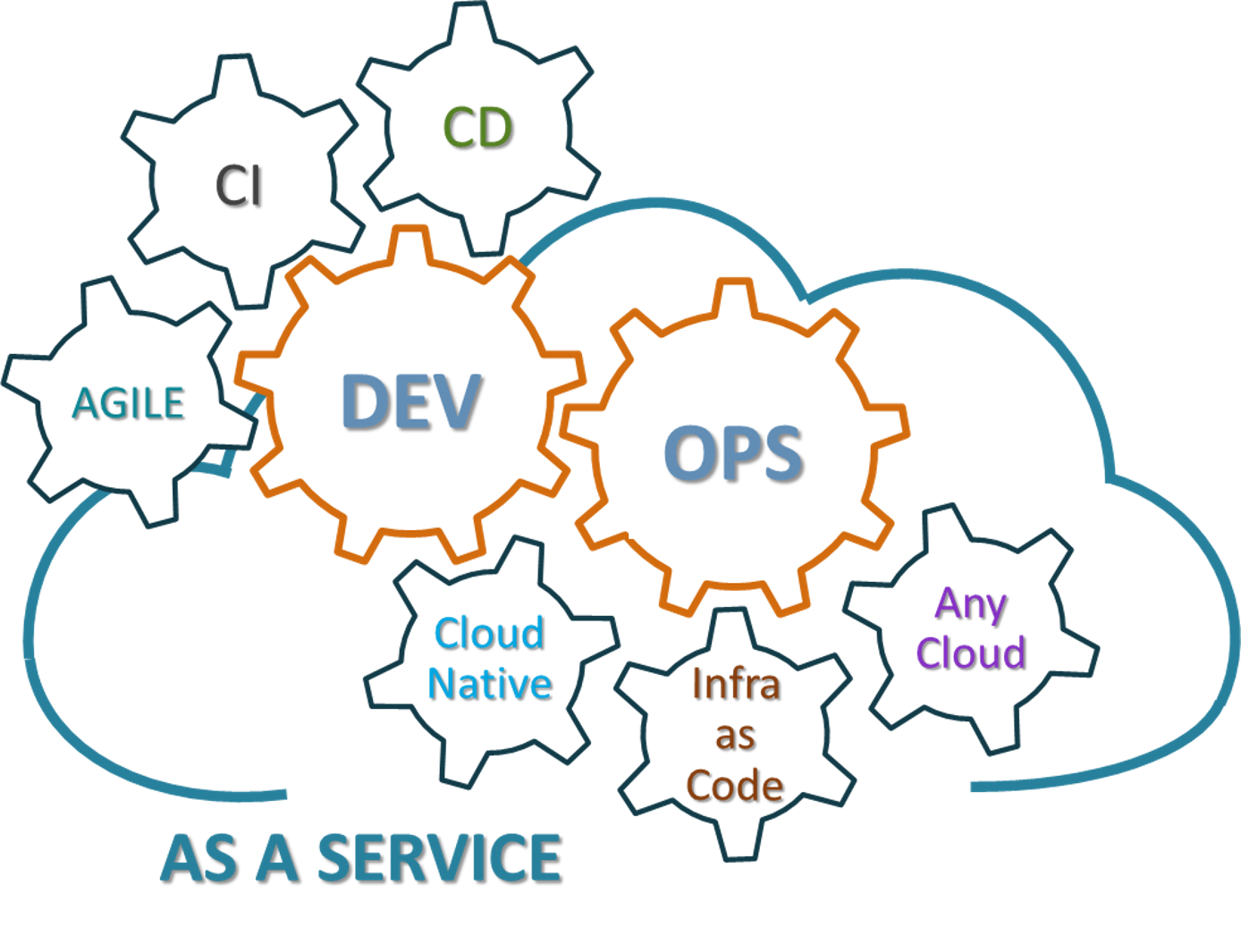// Internationally provided Saas-Solution


Success Story: DevOps-based Platform
Get to the right software product faster with a DevOps Platform. Stay innovative, simplify processes and increase productivity. For companies, these goals are an enormous challenge in times of tight budgets and resources. A prime example of how the synchronised interaction of software development and IT operations can streamline processes and reduce costs is a DevOps-based platform. The SaaS-Solution provided by VALEO IT Services International can be fully integrated into technologies such as IoT and AI and supports customers in making software-based process optimisations and new services available and usable within the shortest possible time.
DevOps combines the abbreviations “Dev” (development) and “Ops” (operations) in one term. This is an approach that eliminates the typical separation between software development and operational IT in the past in order to achieve secure results more quickly with the help of automation and collaboration. Speed up your software development and streamline your delivery processes with DevOps. Discover how you can increase efficiency, improve quality, and revolutionize collaboration in your organization. DevOps is the answer to the challenges of an agile, fast-paced business world. By bringing development and operations closer together, DevOps enables seamless integration, automated processes and a collaborative culture. This leads to faster time-to-market, higher product quality, and improved responsiveness to customer needs.
Success Story: DevOps-based Platform
Get to the right software product faster with a DevOps Platform. Stay innovative, simplify processes and increase productivity. For companies, these goals are an enormous challenge in times of tight budgets and resources. A prime example of how the synchronised interaction of software development and IT operations can streamline processes and reduce costs is a DevOps-based platform. The SaaS-Solution provided by VALEO IT Services International can be fully integrated into technologies such as IoT and AI and supports customers in making software-based process optimisations and new services available and usable within the shortest possible time.
DevOps combines the abbreviations “Dev” (development) and “Ops” (operations) in one term. This is an approach that eliminates the typical separation between software development and operational IT in the past in order to achieve secure results more quickly with the help of automation and collaboration. Speed up your software development and streamline your delivery processes with DevOps. Discover how you can increase efficiency, improve quality, and revolutionize collaboration in your organization. DevOps is the answer to the challenges of an agile, fast-paced business world. By bringing development and operations closer together, DevOps enables seamless integration, automated processes and a collaborative culture. This leads to faster time-to-market, higher product quality, and improved responsiveness to customer needs.
Quote from Head of Global Services
“Today, no one can afford to invest months, if not longer, in developing software and corresponding releases,” knows Erwin Szabo, Head of Global Services. “However, to do this within weeks, days or even a few hours requires a move away from traditional silo thinking and other outdated methods that are still frequently encountered today.”

// Internationally provided Saas-Solution
DevOps-based Platform
“Today, no one can afford to invest months, if not longer, in developing software and corresponding releases,” knows Erwin Szabo, Head of Global Services. “However, to do this within weeks, days or even a few hours requires a move away from traditional silo thinking and other outdated methods that are still frequently encountered today."

Focus on agility, compatibility and continuity
Behind the development of the devops platform of valeo it services international is a global team specialised in infrastructure management and application development. It has its eye on the trend towards mobility and flexibility, which requires web-based solutions with a secure back-end. DevOps is also an ideal approach for bringing software for online services, apps or even process optimisation in production and assembly into practical use in the shortest possible way.
DevOps is not new, yet the it specialists from Luhe-wildenau are pursuing their very own aspirations with the platform they have designed. “The goal is to facilitate the deployment and management of applications in a variety of environments, ensuring full compatibility and continuity for the customer’s infrastructure and business,” explains Senior DevOps Engineer Irinel Alexandru Bodgan. “As part of our devops service, we provide complete support for the platform, which also extends over the entire deployment lifecycle of a software application.”

Focus on agility, compatibility and continuity
Behind the development of the devops platform of valeo it services international is a global team specialised in infrastructure management and application development. It has its eye on the trend towards mobility and flexibility, which requires web-based solutions with a secure back-end. DevOps is also an ideal approach for bringing software for online services, apps or even process optimisation in production and assembly into practical use in the shortest possible way.
DevOps is not new, yet the it specialists from Luhe-wildenau are pursuing their very own aspirations with the platform they have designed. “The goal is to facilitate the deployment and management of applications in a variety of environments, ensuring full compatibility and continuity for the customer’s infrastructure and business,” explains Senior DevOps Engineer Irinel Alexandru Bodgan. “As part of our devops service, we provide complete support for the platform, which also extends over the entire deployment lifecycle of a software application.”


Proven tools and methodes
The prerequisites for achieving this are the most modern tools and methods as well as open, constructive communication between the partners involved, who are working on various projects in the automotive world, in the e-commerce business or even in other industries. In the process, there is no clinging to preserved knowledge. Rather, developer and operational IT teams share their know-how with each other and contribute best practices. This is done according to the principles of agile project management methodology or programming.
VALEO IT Services International’s collaborative DevOps platform simplifies this process even further: it is based on the Infrastructure-as-a-Code (IaC) concept, which generates IT infrastructure services as codes, thus creating the conditions for testing and automated deployment of customised DevOps products developed in a single process. The most modern technologies are used, such as Terraform, Ansible, Python, Groovy, Angular, Jenkins and Harbor. The entire infrastructure, in turn, runs in the AWS cloud from Amazon Web Services. The advantage of this integration is that the resources provided in the cloud can be scaled to the application to be executed. Even with high dynamics, the database load is moderate.
Proven tools and methodes
The prerequisites for achieving this are the most modern tools and methods as well as open, constructive communication between the partners involved, who are working on various projects in the automotive world, in the e-commerce business or even in other industries. In the process, there is no clinging to preserved knowledge. Rather, developer and operational IT teams share their know-how with each other and contribute best practices. This is done according to the principles of agile project management methodology or programming.
VALEO IT Services International’s collaborative DevOps platform simplifies this process even further: it is based on the Infrastructure-as-a-Code (IaC) concept, which generates IT infrastructure services as codes, thus creating the conditions for testing and automated deployment of customised DevOps products developed in a single process. The most modern technologies are used, such as Terraform, Ansible, Python, Groovy, Angular, Jenkins and Harbor. The entire infrastructure, in turn, runs in the AWS cloud from Amazon Web Services. The advantage of this integration is that the resources provided in the cloud can be scaled to the application to be executed. Even with high dynamics, the database load is moderate.

Quick start thanks to barrier-free portable containers
In the so-called DevOps pipeline, which provides a clear framework for developing, creating, testing, and deploying, state-of-the-art container technology is used, which also ensures the necessary consistency of the code. All relevant sources and dependencies are compressed in these containers. With just one of these containers, both microservices and more complex software applications can be executed via the code. They can also be used independently of the operating system.
For example, they can be transferred from a laptop or tablet to a PC, to a virtual test environment or directly to the customer’s warehouse or production facility. With the release or provision of a code, a reusable system module is created in parallel that can be used continuously for further optimizations. “The DevOps infrastructure created via our generic platform provides a combination of tools, processes and practices that support the development, deployment and ongoing maintenance of software applications,” summaries team leader Laura Legian.
This includes version control systems, tools for perpetual automated integration and deployment, configuration management, and control and logging tools.” This infrastructure is permanently maintained and further developed by her and her team at VALEO IT Services International in order to make software applications available in the fastest possible way in a quality-assured manner and to provide the best possible support throughout the entire deployment cycle.

Quick start thanks to barrier-free portable containers
In the so-called DevOps pipeline, which provides a clear framework for developing, creating, testing, and deploying, state-of-the-art container technology is used, which also ensures the necessary consistency of the code. All relevant sources and dependencies are compressed in these containers. With just one of these containers, both microservices and more complex software applications can be executed via the code. They can also be used independently of the operating system.
For example, they can be transferred from a laptop or tablet to a PC, to a virtual test environment or directly to the customer’s warehouse or production facility. With the release or provision of a code, a reusable system module is created in parallel that can be used continuously for further optimizations. “The DevOps infrastructure created via our generic platform provides a combination of tools, processes and practices that support the development, deployment and ongoing maintenance of software applications,” summaries team leader Laura Legian.
This includes version control systems, tools for perpetual automated integration and deployment, configuration management, and control and logging tools.” This infrastructure is permanently maintained and further developed by her and her team at VALEO IT Services International in order to make software applications available in the fastest possible way in a quality-assured manner and to provide the best possible support throughout the entire deployment cycle.

// VALEO IT Services International GmbH
What are the capabilities of DevOps Services?
// VALEO IT Services International GmbH
What are the capabilities of DevOps Services?

DevOps capabilities encompass a wide range of tools, processes, and methodologies that empower teams to achieve their goals effectively. These capabilities can be categorized into several key areas, each contributing to the overall success of DevOps implementation.
By embracing continuous integration, continuous delivery, infrastructure as code, monitoring, collaboration, agile principles, and security measures, organizations can streamline their software development and deployment processes, enhance collaboration between teams, and achieve greater business agility and customer satisfaction.
In today’s agile and fast-paced business environment, the ability to leverage technology effectively is a key competitive advantag. By connecting people, processes, and technologies, DevOps enables continuous delivery of high-quality software and significantly improves business agility.
- Azure – Infrastructure as Code and automation using Azure DevOps and Azure pipelines
- Deploy applications and build microservices automatic deployment
- Integrated automated test plans for code development and deployment
- Monitoring applications with Azure resources with Azure App-Inside
Integrating opensource and enterprise applications using automated deployments with Terraform and Ansible in AWS Cloud - Automated pipelines using Jenkins and Github actions
Applications configuration customization using Ansible and Python - Building integrated applications using cloud native services
- Automated deployment of infrastructure in Public Cloud using Terraform, Ansible and Python automation scripts
- Integrate, customize and deploy applications in DevOps production environments
- CI/CD solution implementation and management using Jenkins/Gitlab
- Automated testing integrated within the deployment pipeline containing unit tests, integration tests and end-to-end tests

DevOps capabilities encompass a wide range of tools, processes, and methodologies that empower teams to achieve their goals effectively. These capabilities can be categorized into several key areas, each contributing to the overall success of DevOps implementation.
By embracing continuous integration, continuous delivery, infrastructure as code, monitoring, collaboration, agile principles, and security measures, organizations can streamline their software development and deployment processes, enhance collaboration between teams, and achieve greater business agility and customer satisfaction.
In today’s agile and fast-paced business environment, the ability to leverage technology effectively is a key competitive advantag. By connecting people, processes, and technologies, DevOps enables continuous delivery of high-quality software and significantly improves business agility.
- Azure – Infrastructure as Code and automation using Azure DevOps and Azure pipelines
- Deploy applications and build microservices automatic deployment
- Integrated automated test plans for code development and deployment
- Monitoring applications with Azure resources with Azure App-Inside
Integrating opensource and enterprise applications using automated deployments with Terraform and Ansible in AWS Cloud - Automated pipelines using Jenkins and Github actions
Applications configuration customization using Ansible and Python - Building integrated applications using cloud native services
- Automated deployment of infrastructure in Public Cloud using Terraform, Ansible and Python automation scripts
- Integrate, customize and deploy applications in DevOps production environments
- CI/CD solution implementation and management using Jenkins/Gitlab
- Automated testing integrated within the deployment pipeline containing unit tests, integration tests and end-to-end tests
// VALEO IT Services International GmbH
Why is DevOps important for the future?
// VALEO IT Services International GmbH
Why is DevOps important for the future?
The DevOps topic is of critical importance for the future for several reasons. These skills are the foundation for a successful DevOps implementation and enable organizations to be more agile, improve the quality of their software, and reduce time-to-market. However, it is important to note that the specific skills and tools used in a DevOps environment can vary by organization and application.
- Speeded up software development: In an increasingly digitized world, the speed at which new software is developed and delivered is a critical success factor. DevOps enables continuous integration, delivery and deployment of software, resulting in shortened development cycles and faster time-to-market. Companies can respond quickly to changing market conditions and introduce innovations faster.
- Agile methods: DevOps builds on agile principles and uses methods such as Scrum or Kanban to improve collaboration, prioritization, planning and flexibility. Agile enables teams to respond quickly to change and make incremental improvements.
- Improved collaboration and communication: DevOps fosters a culture of collaboration and communication between the different teams in an organization, especially between development and operations. By breaking down silos and creating shared responsibility for software quality, organizations can identify and fix problems faster. This increases efficiency and reduces the likelihood of errors.
- Scalability and flexibility: DevOps supports scalable infrastructures and cloud-based services that enable organizations to flexibly adapt their resources and quickly respond to changing requirements. By automating deployment processes, applications can be seamlessly scaled and deployed across different platforms and environments.
- Competitive advantage: Companies that successfully implement DevOps can gain a competitive advantage. They can bring their products and services to market faster, deliver high-quality software, and ensure high customer satisfaction. Those that ignore DevOps risk being overtaken by more agile competitors.
- Higher quality and reliability: DevOps places a strong focus on automated testing, continuous integration and continuous deployment. This minimizes human error and improves software quality and reliability. Automated monitoring and continuous feedback from production enable teams to quickly respond to issues as they arise and continuously improve the software.
- Security: DevOps places great emphasis on integrating security aspects throughout the software development and deployment process. Security by design and continuous security audits are important aspects to ensure that applications are protected from threats.
The DevOps topic is of critical importance for the future for several reasons. These skills are the foundation for a successful DevOps implementation and enable organizations to be more agile, improve the quality of their software, and reduce time-to-market. However, it is important to note that the specific skills and tools used in a DevOps environment can vary by organization and application.
- Speeded up software development: In an increasingly digitized world, the speed at which new software is developed and delivered is a critical success factor. DevOps enables continuous integration, delivery and deployment of software, resulting in shortened development cycles and faster time-to-market. Companies can respond quickly to changing market conditions and introduce innovations faster.
- Agile methods: DevOps builds on agile principles and uses methods such as Scrum or Kanban to improve collaboration, prioritization, planning and flexibility. Agile enables teams to respond quickly to change and make incremental improvements.
- Improved collaboration and communication: DevOps fosters a culture of collaboration and communication between the different teams in an organization, especially between development and operations. By breaking down silos and creating shared responsibility for software quality, organizations can identify and fix problems faster. This increases efficiency and reduces the likelihood of errors.
- Scalability and flexibility: DevOps supports scalable infrastructures and cloud-based services that enable organizations to flexibly adapt their resources and quickly respond to changing requirements. By automating deployment processes, applications can be seamlessly scaled and deployed across different platforms and environments.
- Competitive advantage: Companies that successfully implement DevOps can gain a competitive advantage. They can bring their products and services to market faster, deliver high-quality software, and ensure high customer satisfaction. Those that ignore DevOps risk being overtaken by more agile competitors.
- Higher quality and reliability: DevOps places a strong focus on automated testing, continuous integration and continuous deployment. This minimizes human error and improves software quality and reliability. Automated monitoring and continuous feedback from production enable teams to quickly respond to issues as they arise and continuously improve the software.
- Security: DevOps places great emphasis on integrating security aspects throughout the software development and deployment process. Security by design and continuous security audits are important aspects to ensure that applications are protected from threats.


